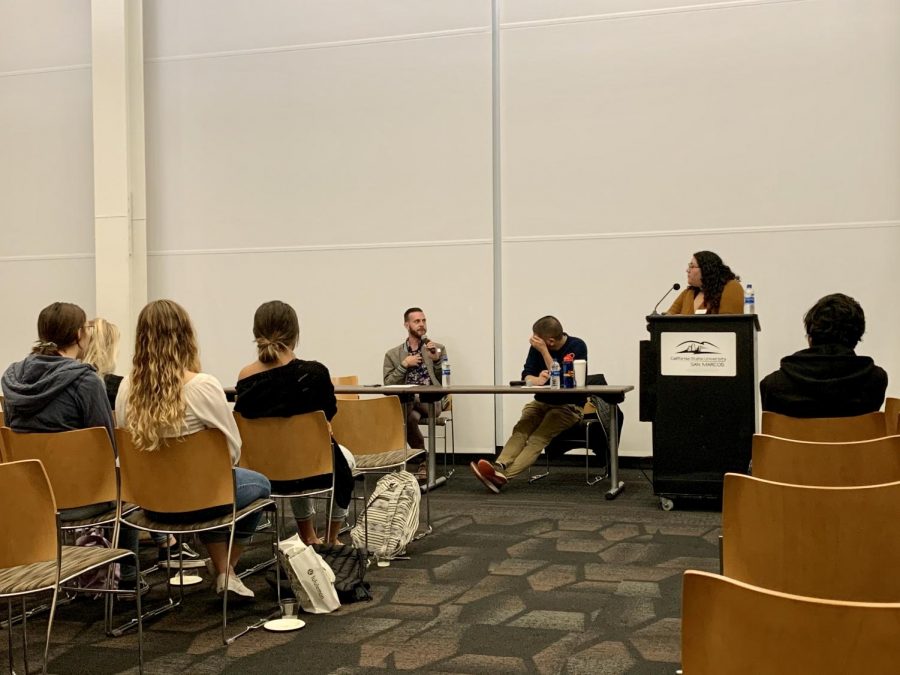Experts on HIV share experiences to educate the public
Local activist open the discussion on HIV while attendees listen in.
HIV advocates gathered for Destigmatizing HIV, a panel that focused on educating an audience of about 25 people on why HIV needs to be destigmatized.
Destigmatizing HIV was the final panel in the Activist Lab Series organized by the Cross-Cultural Center. The panel occurred on Nov. 13 at the USU Ballroom from 5:30 p.m. to 7:30 p.m.
The panelists of the event were Dr. Andrew Spieldenner, an assistant professor of communication, and Mark Maddox, the Director of Volunteer Engagement at Mama’s Kitchen.
Mama’s Kitchen is a community-driven organization that delivers food to people suffering from HIV, cancer and other critical illnesses. Their services are meant to improve the lives of men, women and children who are vulnerable to hunger, according to their mission statement.
One of the questions asked was, “from a community and local standpoint, what are some of the ways that you all have advocated for change and promoted more awareness in regards to HIV advocacy, and can you highlight challenges or triumphs you all have encountered?”
Maddox said, “treating food as medicine [and] treating people, not clients.”
Dr. Spieldenner agreed with this statement when he explained that pharmaceutical companies won’t give up all their medications. He added that it’s nearly impossible to treat everyone with drugs because of the capitalist society we live in.
Some of the challenges Maddox has faced in working at Mama’s Kitchen include landlords denying him and his fellow teammates entry into housing buildings, upon finding out they were delivering food to people with HIV.
Another question asked was directed at Dr. Spieldenner. An audience member asked, “because of your work alongside the UN, can you talk a little bit about some of the specific ways that you have advocated for change or awareness and the successes and challenges you’ve faced along the way at a global level?”
Dr. Spieldenner holds the Vice Chair of the United States People Living with HIV Caucus and let the audience know of his current fight against the “UN trying to remove sexual reproductive rights.”
Dr. Spieldenner went on to say that sexual reproductive rights don’t only affect people with HIV, or whether you’re gay or straight, but affects everyone.
Another question was asked inquiring about the systemic challenges with this issue.
Maddox answered stating the need to understand intersectionality, and that “all of us live within multiple identities.” For him, he often has to ask himself when speaking about an issue, “Who am I excluding?”
Intersectionality, a term coined by Kimberly Crenshaw and defined by the Oxford dictionary, is “the interconnected nature of social categorizations such as race, class and gender as they apply to a given individual or group, regarded as creating overlapping and interdependent systems of discrimination or disadvantage.”
A follow up question was asked on how advocates can play a role in addressing these challenges associated with intersectionality.
Maddox said, “getting comfortable with being uncomfortable.” Dr. Spieldenner said that with his work he’s learned, “Policy is a function of social values … they do not pass laws based on science.”
The last question asked was, “What has helped you be a more effective advocate, or what advice would you have for others who want to advocate?”
For Maddox, the key to remaining passionate about his work is, “Remembering why you got involved in the first place.”
Dr. Spieldenner told the audience he believes in the collective power of “we” and asking yourself, “What is the world we want to change?”
Both panelists encouragedthe audience to reach out and talk to the staff of local elected officials because they’re interested in hearing about what their constituents care about.


